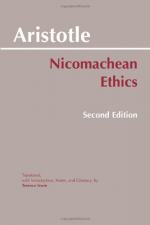|
This section contains 1,678 words (approx. 5 pages at 400 words per page) |

|
Book I Summary and Analysis
Aristotle's Nichomachean Ethics begins with a simple premise, which is that everyone wants to be happy. The best way to become happy takes up much of the rest of the work, as Aristotle examines the nature of happiness what sort of actions lead to it. He is not solely interested in happiness for the individual, but also for the community. Aristotle concludes that to be truly happy one must live a virtuous life, and he discusses several specific virtues and how they are best realized. At the root of all virtue, he claims, is the decision to be virtuous. This decision is based on understanding and reason. Study, he concludes, is the most important activity, then, for it leads to understanding and ultimately to the greatest form of happiness. Aristotle concludes his work with a proposal to examine how...
(read more from the Book I Summary)
|
This section contains 1,678 words (approx. 5 pages at 400 words per page) |

|




